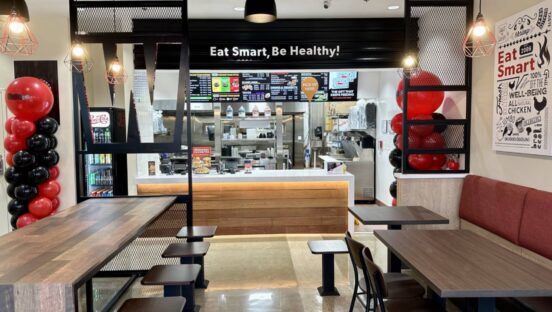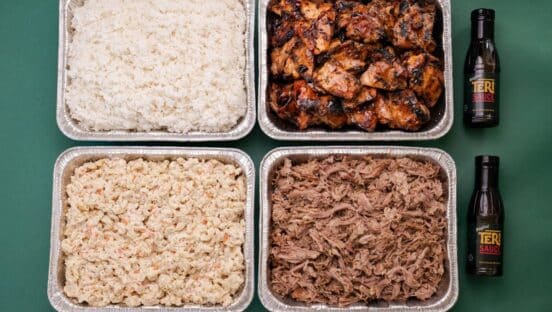Sports stadiums and arenas operate seasonally, and even then only for a few hours each week. Food halls and special markets often have limited hours of operation. Office buildings provide mostly lunchtime sales for food vendors, and college campuses feel deserted in the summer.
Despite the inconsistent traffic, nontraditional venues have proved to be useful business incubators for new quick-service concepts. Just ask the leaders of brands that eschewed the standard growth method by launching in food markets, airports, universities, and other offbeat locations.
Mike Lassiter, CEO of Rising Roll Gourmet Cafe, says the trajectory a new concept takes—whether from traditional stores to nontraditional or vice versa—may be somewhat dependent on the economy.
“Back in 2007, the economy was going in the toilet, and a lot of fast casuals were growing at a rapid pace,” Lassiter says. “It was the new, hot segment, and there was a lot of competition. People were going in and overpaying for real estate. We took a step back and said, Let’s not open a bunch of stores where the economics are not going to work. Let’s look at options.”
Rising Roll operates 16 of its 19 locations in nontraditional venues, mostly well-located office complexes in high-quality buildings and universities. The Atlanta-based company recently announced a new franchise strategy, however, and it includes the development of traditional locations.
Gourmet pretzel concept Brezel also has a foot in each world, having started in Columbus, Ohio’s North Market before expanding to a brick-and-mortar location in Cincinnati’s revitalized Over-the-Rhine neighborhood.
Brittany Baum, founder of Brezel, started selling her hand-rolled Bavarian pretzels at various farmers’ markets before securing a permanent North Market space. Three years later, she opened the Over-the-Rhine store. Now that she’s experienced the business from both sides, she says there are advantages and disadvantages to each.
“In an established market like North Market, they take care of all the operations for the market,” she says. “If there’s a plumbing issue, I contact the market operations person, and they schedule having it fixed. They make sure everything is taken care of, from the bathrooms to the grease traps.” Baum says the hall also has a marketing professional on staff.
When it comes to her brick-and-mortar store, the rent per square foot may be a bit lower, she says, but responsibility for all operations and marketing sits squarely on her shoulders. From a marketing standpoint, it gives Baum more autonomy and creative freedom. Management must approve signage at the market, but at the brick-and-mortar store, she creates window displays, signage, and even chalk art on the pavement outside to advertise her pretzels.
Baum says pretzels aren’t something people need every day, so to be successful, Brezel has to situate itself in areas with high foot traffic. Nontraditional venues are generally great for serendipitously attracting customers, but Brezel has come up against a major obstacle.
“Many nontraditional venues like malls already have an Auntie Anne’s Pretzels in place with a noncompete, so those are out,” Baum says.
Micha Magid, cofounder of Mighty Quinn’s BBQ, also faces real estate obstacles when searching for new locations. The New York City fast casual cooks its meats over a wood-fueled fire, which is something outdoor markets are well suited for, but it can be a fair-weather endeavor. Mighty Quinn’s has eight locations, including six traditional stores equipped for combustible-fuel cooking, a seasonal weekend-only market location, and a spot at Yankee Stadium.
The barbecue concept used Brooklyn’s Smorgasburg market as a testing ground before going into any brick-and-mortar locations.
“We did well right out of the gate, and saw there that we had a following and that the concept was scalable and we could run seven days a week with a bigger menu,” Magid says. “It’s easier to run a kiosk; there are fewer headaches. A market you do on weekends is a lot less demanding than having customers daily. But in a restaurant, you can offer variety and specials, and the volume is bigger. So that’s the tradeoff.”
After a year at Smorgasburg, Mighty Quinn’s opened its first brick-and-mortar restaurant in December 2012. It took longer, about 18 months, to open a second.
When a concept moves from a nontraditional venue to a standard format, interaction with customers changes. Whether in a downtown business area or residential neighborhood, a traditional location draws regular customers, whereas markets, airports, and stadium venues serve more visitors to the area.
“The North Market is across the street from a convention center, so we get a lot of tourists or people in town for a convention,” Baum says. “We get customers who come back year after year rather than week after week. At our brick and mortar, there are not as many tourists.”
Another aspect of the business that changes when switching formats is hiring. Often, in nontraditional venues, a restaurant has a built-in audience thanks to the high volumes at airports, office complexes, food halls, and the like. But unless potential employees are frequent fliers or work in the office, they might not know a restaurant is there.
“In a high-rise building, hiring is especially challenging,” Lassiter says. “You’ve got law firms and real estate firms, but to look for hourly employees in that setting, you really have to work hard. You can’t just put up a sign that says, ‘Now hiring.’ The right people won’t see it.”
On the other hand, a college campus location ensures a steady supply of potential workers. Still, such scenarios lack of permanency, which Lassiter says Rising Roll tries to balance by hiring a mix of college students and local residents. The result, he says, is both stability and flexibility.
Brezel and Mighty Quinn’s achieve stability and flexibility by cross-training workers so they can jump in at either location type—market or store—as needed.
For any concept with multiple venue types, a staff trained to work at both can relieve pressure. It’s especially helpful at seasonally driven concepts where the end of a sports season or close of a school year can sometimes lead to layoffs.








